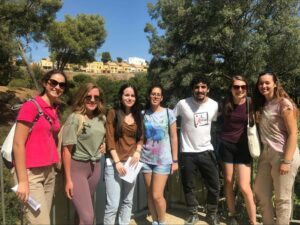
What to take on a school trip abroad?
Embarking on a school trip abroad is an exciting and enriching student experience. It gives students the unique opportunity to
You are on our High Schools -> School Trips pages!
The first step is to choose a destination that aligns with the learning objectives of the trip. We recommend collaborating with colleagues and experts to design a comprehensive itinerary incorporating key cultural and historical sites.
If you’re unsure where to start, refer to our comprehensive 9-step guide on How to Plan An International School Trip.
It’s vital to prepare students for this experience. Introduce them to the destination’s culture, history, and language to minimize culture shock. Encourage them to conduct research and prepare questions or topics of interest for pre-trip sessions to enhance engagement.
Clear communication with parents or guardians about the trip’s educational objectives and logistical details is necessary, especially since your students are probably underage. It’s equally important to collect necessary consent forms and medical information for a smooth, organized experience.

Engage professional guides for expert insights during visits to historical sites, museums, and other points of interest. Incorporate interactive activities like scavenger hunts or group discussions to enhance learning and engagement.
Encourage students to interact with locals, practice the language, and participate in community activities to foster deeper cultural understanding. For a better grasp of the local culture, consider organizing homestays, community service projects, or cultural exchanges.
Allocate time for reflection and journaling, allowing students to process their experiences and capture their thoughts in a travel journal or blog. Organizing group discussions and debriefing sessions can further facilitate critical thinking and knowledge sharing.

Integrating post-trip activities into the curriculum reinforces lessons learned and provides students with opportunities to showcase their knowledge. Encourage them to share their experiences and insights with classmates and educators through presentations, essays, or creative projects.
Encourage students to share their experiences with the wider school community through presentations or articles. This promotes global citizenship and inspires others. By facilitating ongoing learning and engagement, the post-trip follow-up ensures the educational impact of the school trip abroad is sustained long after students return home.
By effectively preparing and implementing these steps, your students will benefit from a rewarding and transformative school trip abroad. They will develop a deeper understanding of different cultures, enhance their knowledge, and foster critical thinking skills. The post-trip follow-up ensures the long-term sustainability of the educational impact, enhancing global citizenship and inspiring others to explore the world.

Embarking on a school trip abroad is an exciting and enriching student experience. It gives students the unique opportunity to

Are you planning a school trip abroad and wondering how to raise funds? This article will explore strategies to fundraise

School trips abroad are a life-changing experience for students where they learn beyond the classroom while exploring a foreign culture.

School trips abroad give students a transformative educational experience and numerous benefits. Through these experiences, students are granted valuable opportunities
Planning a school trip?
Where should we send you the brochure?
Receive travel and education information directly in your inbox
Where should we send you it?
Receive your brochure
Where should we send you the brochure?